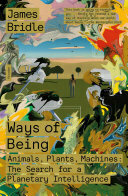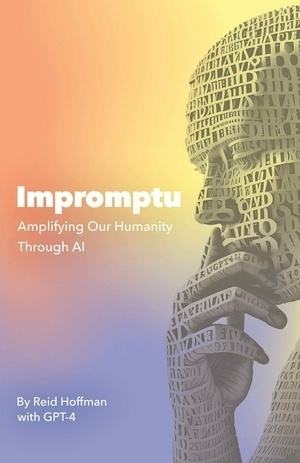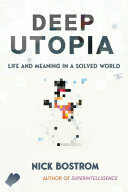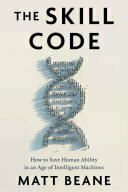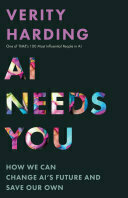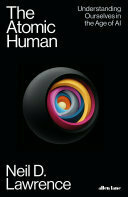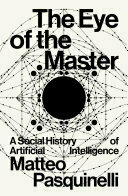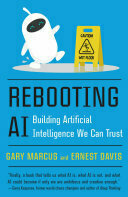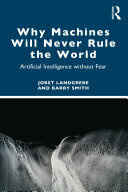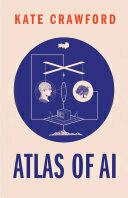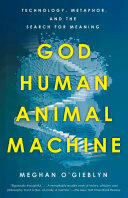(List last updated 2024-10-15, first written 2023-12-29)
Ever since the generative AI chatGPT craze started - it’s been just over a year since it launched if you can believe that - I’ve been looking for some nice meaty but lay-person-adjacent books to help me understand how best to think about the contemporary variant of artificial intelligence hype.
Not necessarily the technical details, the code underlying the seeming magic - or at least not only those details. I’m interested too in the more more philosophical, more political domains of thought. What will AI do to society? What might it improve, what might it make worse? How best should we consider and handle it to ensure it does more of the former than the latter? Or is it all a tech-bro mirage, nothing more than a technological flash in a pan?
Whilst the current instantiation of the newer large language model public demos are still new enough that there’s likely not been enough time for a huge number of reliable comprehensive-but-approachable books to have been written, it’s not like people weren’t already thinking about AI from both technical and philosophical viewpoints way before OpenAI came to be.
The distinct field of what could be called “AI studies” has been around at least 60 years, depending on how you count it. I certainly was exposed to it at university quite some years ago. Alan Turing was considering whether machines could think back in 1950. And people’s thoughts and dreams about aspects of future AIs have likely been around far longer - centuries longer - as cultural artifacts and thought experiments, even if they use very different terminology. Undoubtedly there’s plenty of very interesting and thoughtful work out there.
Anyway, here’s a few books that have piqued my interest, mostly culled from various articles or podcasts about AI I must have perused over the past few months. They’re not exactly recommendations, as I haven’t yet read them. But I hope to do so one day, and would welcome any other suggestions.
Before the most recent hype cycle I’d already read a handful of works on AI. Three of the ones that I felt I got something useful out of were:
- Superintelligence: Paths, Dangers, Strategies, by Nick Bostrom
- Life 3.0: Being Human in the Age of Artificial Intelligence, by Max Tegmark
- Weapons of Math Destruction by Cathy O’Neil
Anyway, here’s my basic fantasy to-read list, in no particular order:
And now the same list again, but this time with some of the publisher blurb to help give a clue on what they’re actually about:
God, Human, Animal, Machine: Technology, Metaphor, and the Search for Meaning by Meghan O’Gieblyn
A strikingly original exploration of what it might mean to be authentically human in the age of artificial intelligence
…
For most of human history the world was a magical and enchanted place ruled by forces beyond our understanding. The rise of science and Descartes’s division of mind from world made materialism our ruling paradigm, in the process asking whether our own consciousness—i.e., souls—might be illusions. Now the inexorable rise of technology, with artificial intelligences that surpass our comprehension and control, and the spread of digital metaphors for self-understanding, the core questions of existence—identity, knowledge, the very nature and purpose of life itself—urgently require rethinking.
Atlas of AI: Power, Politics, and the Planetary Costs of Artificial Intelligence, by Kate Crawford:
The hidden costs of artificial intelligence, from natural resources and labor to privacy, equality, and freedom
What happens when artificial intelligence saturates political life and depletes the planet? How is AI shaping our understanding of ourselves and our societies? In this book Kate Crawford reveals how this planetary network is fueling a shift toward undemocratic governance and increased racial, gender, and economic inequality. Drawing on more than a decade of research, award‑winning science, and technology, Crawford reveals how AI is a technology of extraction: from the energy and minerals needed to build and sustain its infrastructure, to the exploited workers behind “automated” services, to the data AI collects from us.
Rather than taking a narrow focus on code and algorithms, Crawford offers us a political and a material perspective on what it takes to make artificial intelligence and where it goes wrong. While technical systems present a veneer of objectivity, they are always systems of power. This is an urgent account of what is at stake as technology companies use artificial intelligence to reshape the world.
Why Machines Will Never Rule the World: Artificial Intelligence without Fear, by Jobst Landgrebe, Barry Smith:
The book’s core argument is that an artificial intelligence that could equal or exceed human intelligence—sometimes called artificial general intelligence (AGI)—is for mathematical reasons impossible…
Landgrebe and Smith show how a widespread fear about AI’s potential to bring about radical changes in the nature of human beings and in the human social order is founded on an error. There is still, as they demonstrate in a final chapter, a great deal that AI can achieve which will benefit humanity. But these benefits will be achieved without the aid of systems that are more powerful than humans, which are as impossible as AI systems that are intrinsically “evil” or able to “will” a takeover of human society.
Rebooting AI: Building Artificial Intelligence We Can Trust, by Gary F. Marcus and Ernest Davis:
Two leaders in the field offer a compelling analysis of the current state of the art and reveal the steps we must take to achieve a truly robust AI.
Despite the hype surrounding AI, creating an intelligence that rivals or exceeds human levels is far more complicated than we are led to believe…The world we live in is wildly complex and open-ended. How can we bridge this gap? What will the consequences be when we do? Marcus and Davis show us what we need to first accomplish before we get there and argue that if we are wise along the way, we won’t need to worry about a future of machine overlords. If we heed their advice, humanity can create an AI that we can trust in our homes, our cars, and our doctor’s offices.
Reboot provides a lucid, clear-eyed assessment of the current science and offers an inspiring vision of what we can achieve and how AI can make our lives better.
The Coming Wave; Technology, Power, and the Twenty-first Century’s Greatest Dilemma by Mustafa Suleyman.
An urgent warning of the unprecedented risks that AI and other fast-developing technologies pose to global order, and how we might contain them while we have the chance…
In The Coming Wave , Suleyman shows how these forces will create immense prosperity but also threaten the nation-state, the foundation of global order. As our fragile governments sleepwalk into disaster, we face an existential unprecedented harms on one side, the threat of overbearing surveillance on the other.
…
This groundbreaking book from the ultimate AI insider establishes “the containment problem”—the task of maintaining control over powerful technologies—as the essential challenge of our age.
The Eye of the Master: A Social History of Artificial Intelligence by Matteo Pasquinelli.
What is AI? A dominant view describes it as the quest “to solve intelligence,” a solution supposedly to be found in the secret logic of the mind or in the deep physiology of the brain, such as in its complex neural networks.
The Eye of the Master argues, to the contrary, that the inner code of AI is shaped not by the imitation of biological intelligence, but the intelligence of labour and social relations, as it is found in Babbage’s “calculating engines” of the industrial age as well as in the recent algorithms for image recognition and surveillance.
…
The Eye of the Master urges a new literacy on AI for scientists, journalists and new generations of activists, who should recognise that the “mystery” of AI is just the automation of labour at the highest degree, not intelligence per se.
Impromptu: Amplifying Our Humanity Through AI, by Reid Hoffman
Amplifying Our Humanity Through AI, written by Reid Hoffman with GPT-4, offers readers a travelog of the future – exploring how AI, and especially Large Language Models like GPT-4, can elevate humanity across key areas like education, business, and creativity
…
His conversation with AI takes us on a journey to the future, where AI is not a threat, but a partner….How might humanity use GPT-4 to continue our long-standing quest to make life more meaningful and prosperous? How can we use it to help solve some of the hardest challenges we face? To expand opportunities for self-determination and self-expression? Along with solutions and opportunities, GPT-4 will also create its own challenges and uncertainties. Impromptu explores how we might address risk as we continue to develop AI technologies that can boost human progress at a time when the need for rapid solutions at scale has never been greater.
Ways of Being: Animals, Plants, Machines: The Search for a Planetary Intelligence, by James Bridle.
Recent years have seen rapid advances in ‘artificial’ intelligence, which increasingly appears to be something stranger than we ever imagined. At the same time, we are becoming more aware of the other intelligences which have been with us all along, unrecognized. These other beings are the animals, plants, and natural systems that surround us, and are slowly revealing their complexity and knowledge - just as the new technologies we’ve built are threatening to cause their extinction, and ours.
…
From Greek oracles to octopuses, forests to satellites, Bridle tells a radical new story about ecology, technology and intelligence. We must, they argue, expand our definition of these terms to build a meaningful and free relationship with the non-human, one based on solidarity and cognitive diversity. We have so much to learn, and many worlds to gain.
**The Atomic Human: Understanding Ourselves in the Age of AI, by Neil D. Lawrence**.
What does Artificial Intelligence mean for our identity? Our fascination with AI stems from the perceived uniqueness of human intelligence. We believe it’s what differentiates us. Fears of AI not only concern how it invades our digital lives, but also the implied threat of an intelligence that displaces us from our position at the centre of the world.»Neil D. Lawrence’s visionary book shows why these fears may be misplaced.
…
By contrasting our capabilities with machine intelligence, The Atomic Human reveals the technical origins, capabilities and limitations of AI systems, and how they should be wielded. Not just by the experts, but ordinary people. Understanding this will enable readers to choose the future we want – either one where AI is a tool for us, or where we become a tool of AI – and how to counteract the digital oligarchy to maintain the fabric of an open, fair and democratic society.
AI Needs You: How We Can Change AI’s Future and Save Our Own, by Verity Harding.
Artificial intelligence may be the most transformative technology of our time. As AI’s power grows, so does the need to figure out what—and who—this technology is really for. AI Needs You argues that it is critical for society to take the lead in answering this urgent question and ensuring that AI fulfills its promise.
…
History points the way to an achievable future in which democratically determined values guide AI to be peaceful in its intent; to embrace limitations; to serve purpose, not profit; and to be firmly rooted in societal trust.
The Skill Code: How to Save Human Ability in an Age of Intelligent Machine, by Matt Beane
From one of the world’s top researchers on work and technology comes an insightful and surprising guide to protecting your skill in a world filling with AI and robots. Think of your most valuable skill, the thing you can reliably do under pressure to deliver results. How did you learn it? Whatever your job – plumber, attorney, teacher, surgeon – decades of research show that you achieved mastery by working with someone who knew more than you did. Formal learning—school and books—gave you conceptual knowledge, but you developed your skill by working with an expert. Today, this essential bond is under threat.
…
Whether you’re an expert or a novice, this book will show you how to build skill more effectively – and how to make intelligent technologies part of the solution, not the problem.
Deep Utopia: Life and Meaning in a Solved World, by Nick Bostrom
Bostrom’s previous book, Paths, Dangers, Strategies changed the global conversation on AI and became a New York Times bestseller. It focused on what might happen if AI development goes wrong. But what if things go right?
Suppose that we develop superintelligence safely, govern it well, and make good use of the cornucopian wealth and near magical technological powers that this technology can unlock. If this transition to the machine intelligence era goes well, human labor becomes obsolete. We would thus enter a condition of “post-instrumentality”, in which our efforts are not needed for any practical purpose. Furthermore, at technological maturity, human nature becomes entirely malleable.
Here we confront a challenge that is not technological but philosophical and spiritual. In such a solved world, what is the point of human existence? What gives meaning to life? What do we do all day?

